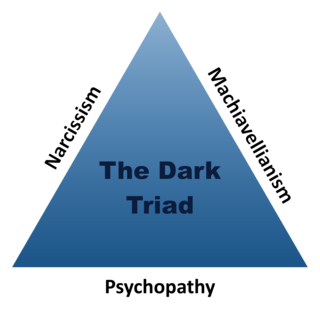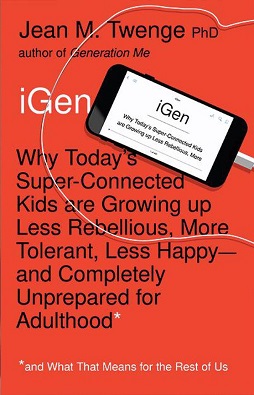Self-esteem is confidence in one's own worth, abilities or morals. Self-esteem encompasses beliefs about oneself as well as emotional states, such as triumph, despair, pride, and shame. Smith and Mackie (2007) defined it by saying "The self-concept is what we think about the self; self-esteem, is the positive or negative evaluations of the self, as in how we feel about it ."
Narcissistic personality disorder (NPD) is a personality disorder that involves self-loathing, a fragile self-esteem and compensatory self-importance. It is also associated with primitive defence mechanisms and a superiority complex that protect the individual psychologically. The conduct of one's life is often disingenuous in the patient population and the avoidance of the appearance of inferiority (dependence) is common. Research has pointed that agreeableness is exceedingly low translating to lack of empathy and altruism. NPD is characterized by a life-long pattern of:

Economic materialism can be described as either a personal attitude that attaches importance to acquiring and consuming material goods or as a logistical analysis of how physical resources are shaped into consumable products.
In law, an entitlement is a provision made in accordance with a legal framework of a society. Typically, entitlements are based on concepts of principle ("rights") which are themselves based in concepts of social equality or enfranchisement.

Narcissism is a self-centered personality style characterized as having an excessive preoccupation with oneself and one's own needs, often at the expense of others.
Malignant narcissism is a psychological syndrome comprising an extreme mix of narcissism, antisocial behavior, aggression, and sadism. Grandiose, and always ready to raise hostility levels, the malignant narcissist undermines families and organizations in which they are involved, and dehumanizes the people with whom they associate.

The dark triad is a psychological theory of personality, first published by Delroy L. Paulhus and Kevin M. Williams in 2002, that describes three notably offensive, but non-pathological personality types: Machiavellianism, sub-clinical narcissism, and sub-clinical psychopathy. Each of these personality types is called dark because each is considered to contain malevolent qualities.

"The World Should Revolve Around Me" is the debut single of American pop-R&B duo Little Jackie. The song became a top-20 hit on the UK Singles Chart, and also peaked within the top 30 of the Irish Singles Chart. Upon its release, the song was met with a favorable reception from critics, who praised the song's Motown-esque production; however, some sociologists criticized the song, opining that it glamorized narcissism and demonstrated that the United States' narcissism is not declining. In the United States, the song appeared on the Billboard Pop 100, also appearing as the theme song for the VH1 reality TV series New York Goes to Hollywood.
In psychology, grandiosity is a sense of superiority, uniqueness, or invulnerability. It may be expressed by exaggerated beliefs regarding one's abilities, the belief that few other people have anything in common with oneself, and that one can only be understood by a few, very special people. The personality trait of grandiosity is principally associated with narcissistic personality disorder (NPD), but also is a feature in the occurrence and expression of antisocial personality disorder, and the manic and hypomanic episodes of bipolar disorder.
The Narcissistic Personality Inventory (NPI) was developed in 1979 by Raskin and Hall, and since then, has become one of the most widely utilized personality measures for non-clinical levels of the trait narcissism. Since its initial development, the NPI has evolved from 220 items to the more commonly employed NPI-40 (1984) and NPI-16 (2006), as well as the novel NPI-1 inventory (2014). Derived from the DSM-III criteria for Narcissistic personality disorder (NPD), the NPI has been employed heavily by personality and social psychology researchers.
In psychology, manipulation is defined as subterfuge designed to influence or control another, usually in a manner which facilitates one's personal aims. The methods used distort or orient the interlocutor's perception of reality, in particular through seduction, suggestion, persuasion and non-voluntary or consensual submission. Definitions for the term vary in which behavior is specifically included, influenced by both culture and whether referring to the general population or used in clinical contexts. Manipulation is generally considered a dishonest form of social influence as it is used at the expense of others.
A narcissistic parent is a parent affected by narcissism or narcissistic personality disorder. Typically, narcissistic parents are exclusively and possessively close to their children and are threatened by their children's growing independence. This results in a pattern of narcissistic attachment, with the parent considering that the child exists solely to fulfill the parent's needs and wishes. A narcissistic parent will often try to control their children with threats and emotional abuse. Narcissistic parenting adversely affects the psychological development of children, affecting their reasoning and their emotional, ethical, and societal behaviors and attitudes. Personal boundaries are often disregarded with the goal of molding and manipulating the child to satisfy the parent's expectations.
Attention seeking behavior is to act in a way that is likely to elicit attention. Attention seeking behavior is defined in the DSM-5 as "engaging in behavior designed to attract notice and to make oneself the focus of others' attention and admiration". This definition does not ascribe a motivation to the behavior and assumes a human actor, although the term "attention seeking" sometimes also assumes a motive of seeking validation. People are thought to engage in both positive and negative attention seeking behavior independent of the actual benefit or harm to health. In line with much research and a dynamic self-regulatory processing model of narcissism, motivations for attention seeking are considered to be driven by self-consciousness and thus an externalization of personality rather than internal and self-motivated behavior. Attention seeking is often caused by threats to one's self-concept and the need for social acceptance. This type of influence on behavior can result in a potential loss of a person's sense of agency, personality disorder and the behavior associated with these conditions.
Healthy narcissism is a positive sense of self that is in alignment with the greater good. The concept of healthy narcissism was first coined by Paul Federn and gained prominence in the 1970s through the research of Heinz Kohut and Otto Kernberg. It developed slowly out of the psychoanalytic tradition, and became popular in the late twentieth century.
In social psychology, collective narcissism is the tendency to exaggerate the positive image and importance of a group to which one belongs. The group may be defined by ideology, race, political beliefs/stance, religion, sexual orientation, social class, language, nationality, employment status, education level, cultural values, or any other ingroup. While the classic definition of narcissism focuses on the individual, collective narcissism extends this concept to similar excessively high opinions of a person's social group, and suggests that a group can function as a narcissistic entity.
Narcissism in the workplace involves the impact of narcissistic employees and managers in workplace settings.
In gender studies, the analysis of gender differences in narcissism shows that male narcissism and female narcissism differ in a number of aspects.
William Keith Campbell is an American social psychologist known for his research on narcissism. He is a professor in the Department of Psychology in the University of Georgia's Franklin College of Arts and Sciences. He completed his BA at University of California, Berkeley, MA from University of California, San Diego, PhD at University of North Carolina at Chapel Hill. He has published over 120 peer-reviewed papers and a number of books, including The Handbook of Narcissism and Narcissistic Personality Disorder: Theoretical Approaches, Empirical Findings, and Treatments and The Narcissism Epidemic: Living in the Age of Entitlement.

iGen is a 2017 nonfiction book by Jean Twenge that studies the lifestyles, habits and values of Americans born 1995–2012, the first generation to reach adolescence after smartphones became widespread. Twenge refers to this generation as the "iGeneration". Although she argues there are some positive trends, she expresses concern that the generation is being isolated by technology.

In the field of personality psychology, Machiavellianism is a personality trait centered on the manipulation and exploitation of others, callousness, and an indifference to morality, with a strategic focus on self interest. Psychologists Richard Christie and Florence Geis named the trait after Niccolò Machiavelli, as they used edited and truncated statements inspired by his works to study variations in human behaviors. Their Mach IV test, a 20-question, Likert-scale personality survey, became the standard self-assessment tool and scale of the Machiavellianism construct. Those who score high on the scale are more likely to have a high level of deceitfulness and a cynical, unempathetic temperament.





